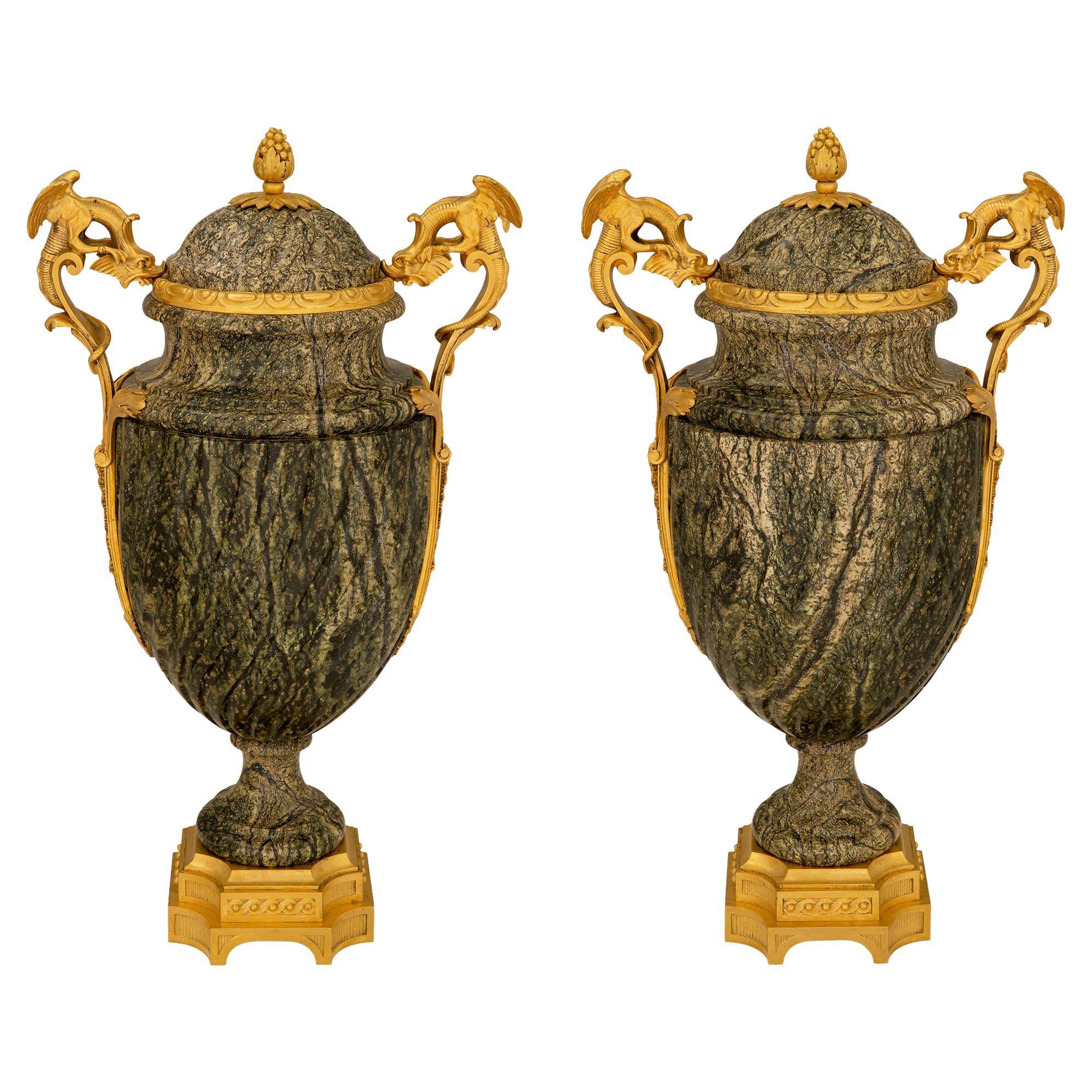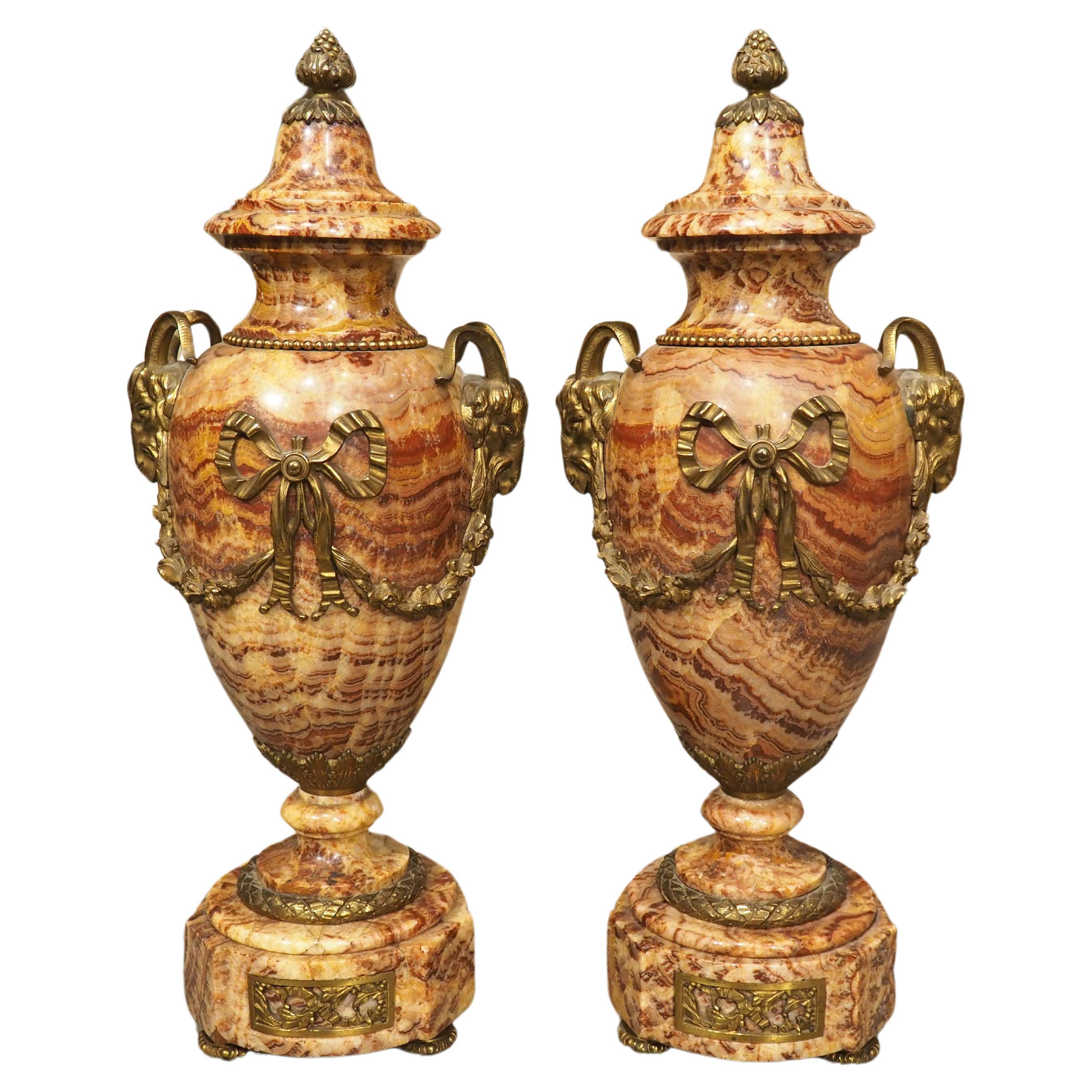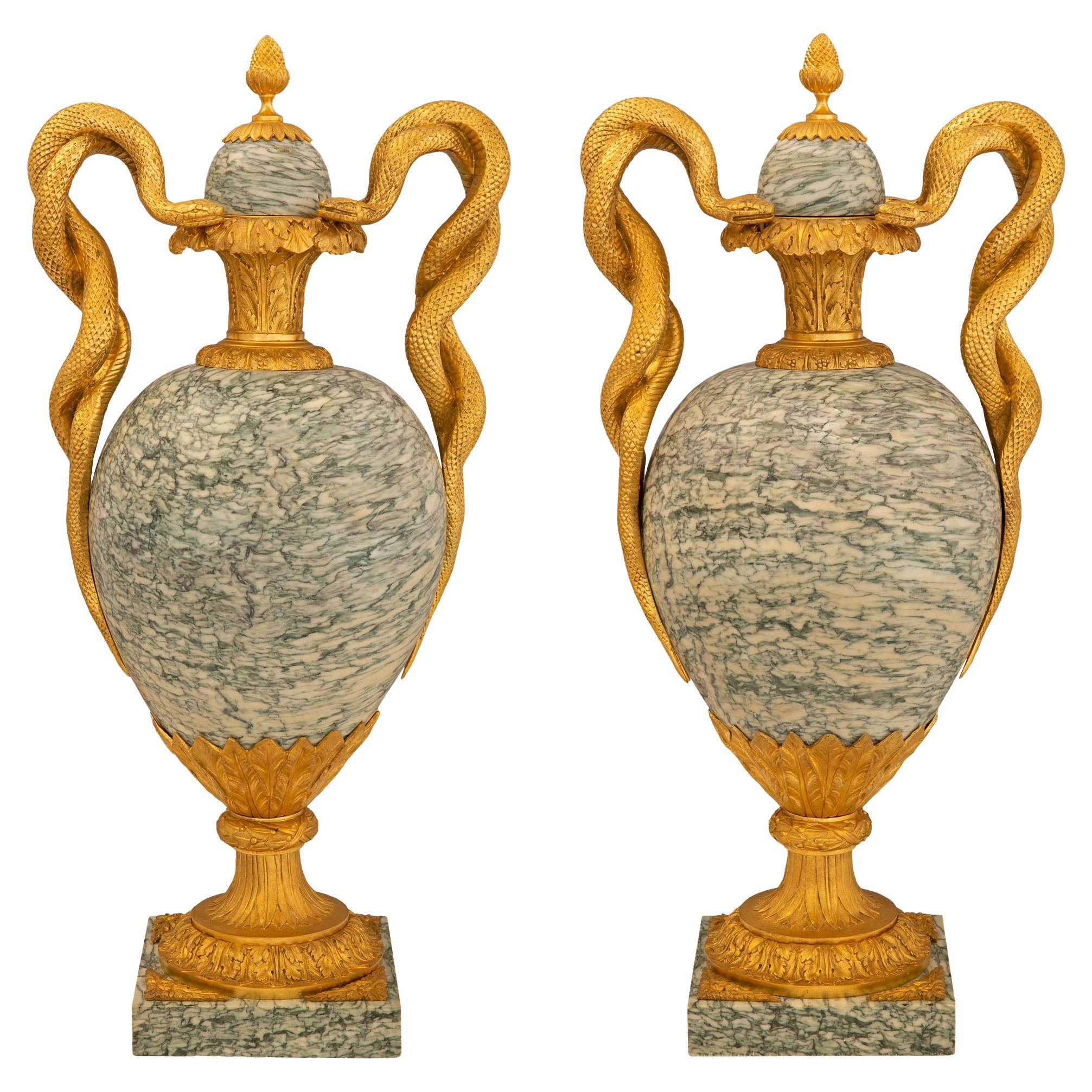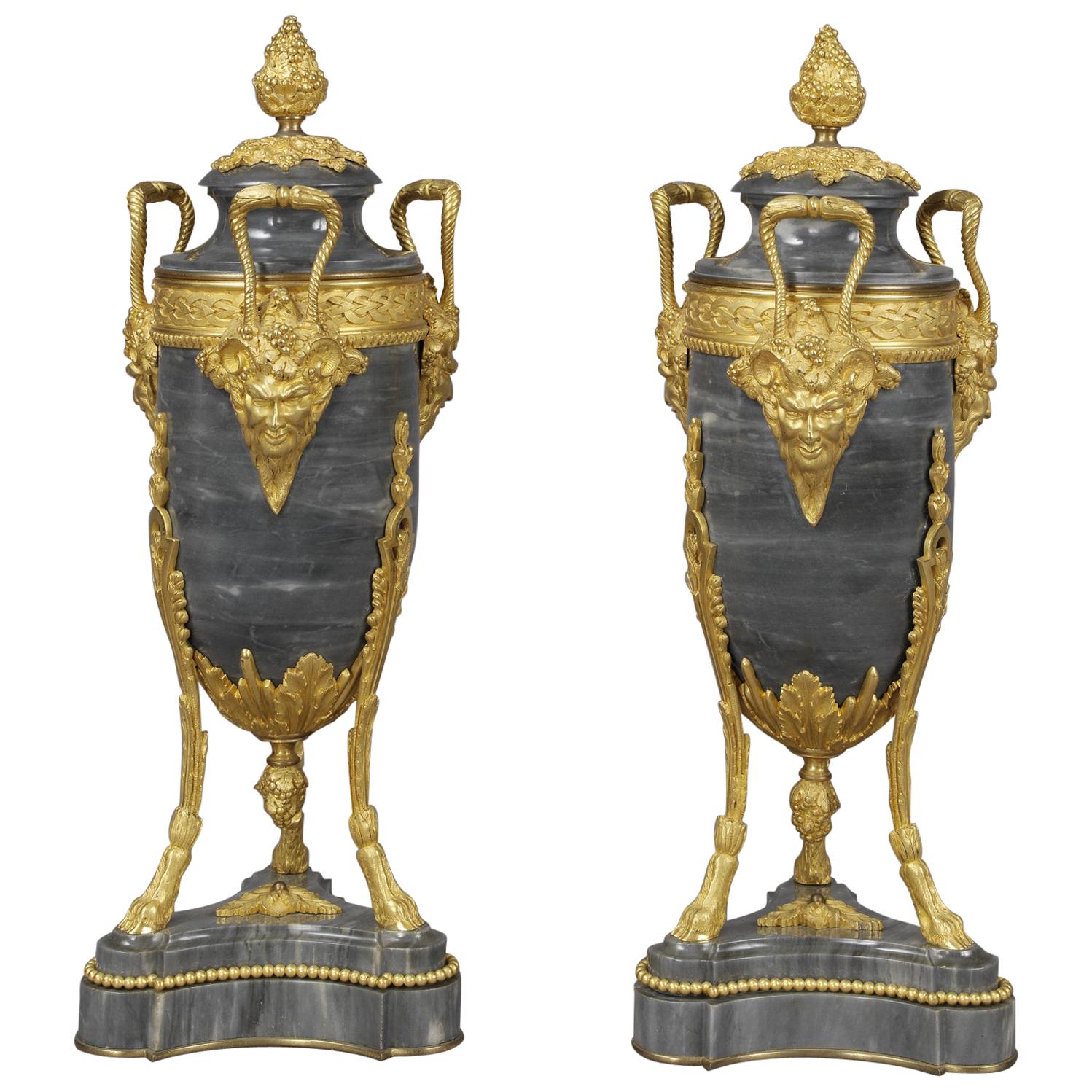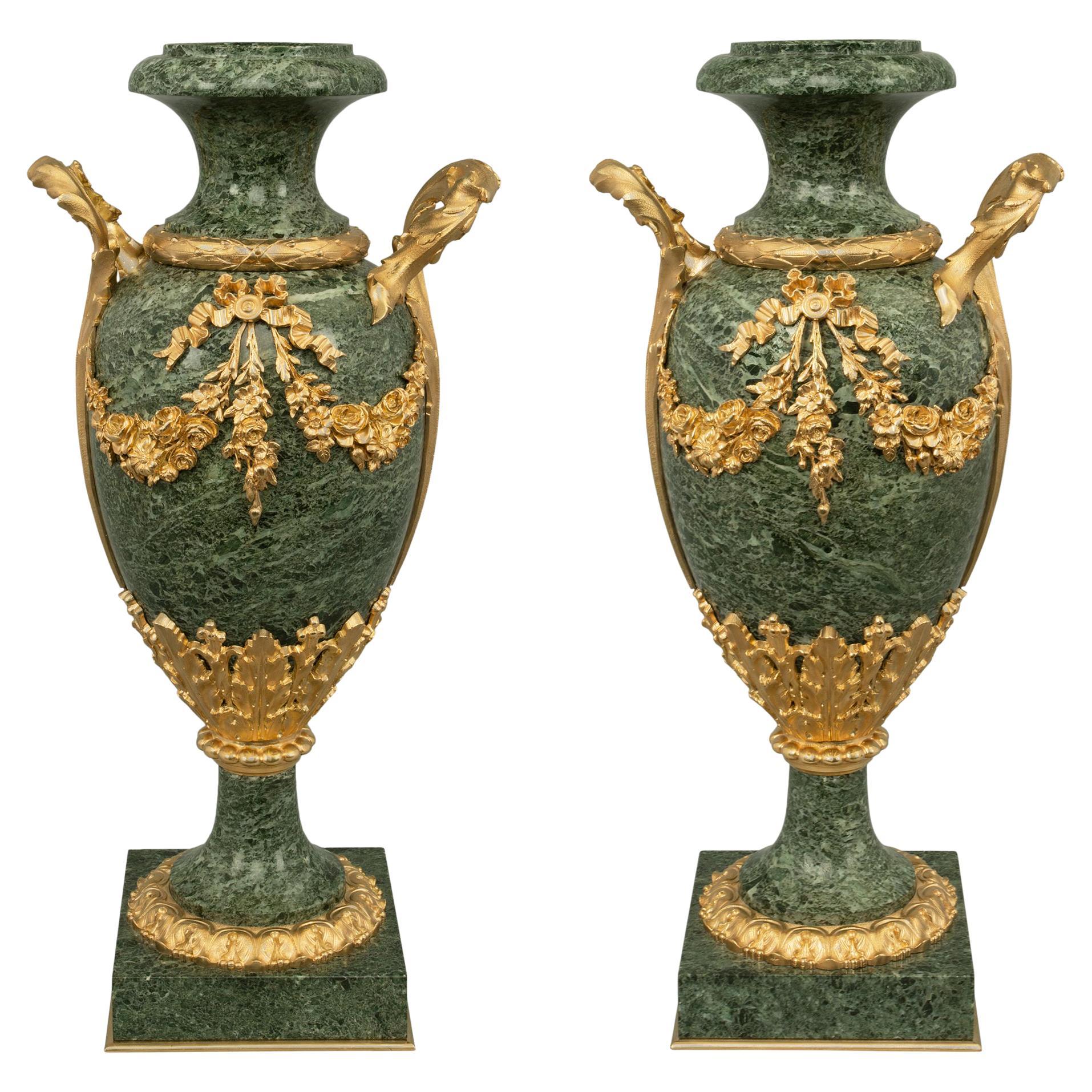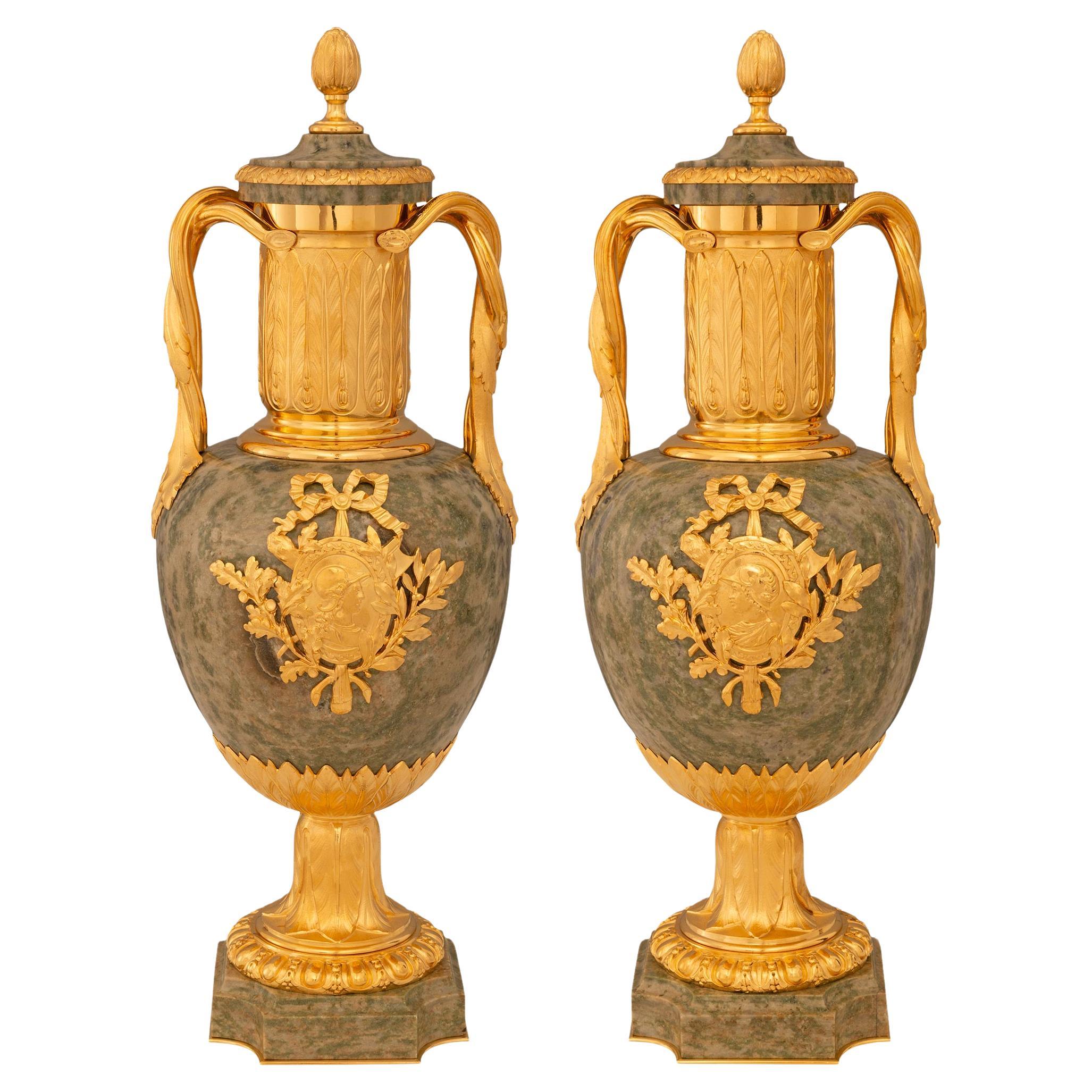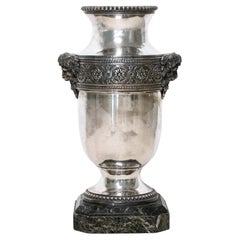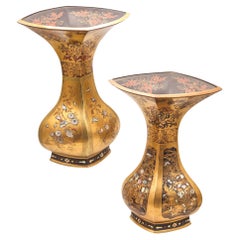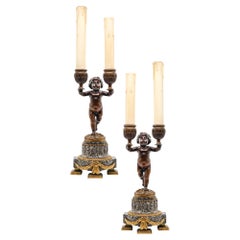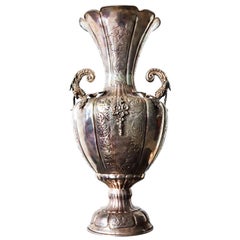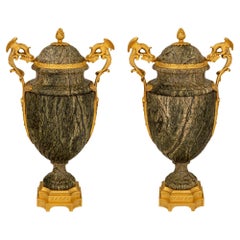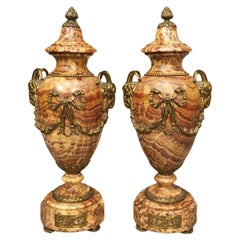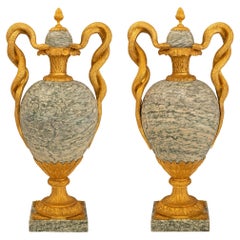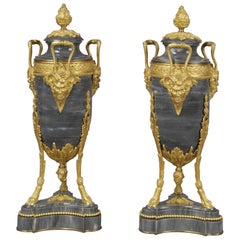Items Similar to French 1870 Third Empire Napoleon III Pair of Urns in Marble with Gilded Ormolu
Want more images or videos?
Request additional images or videos from the seller
1 of 8
French 1870 Third Empire Napoleon III Pair of Urns in Marble with Gilded Ormolu
$4,985per set
£3,794.68per set
€4,374.32per set
CA$7,099.25per set
A$7,742.96per set
CHF 4,070.93per set
MX$93,664.30per set
NOK 50,800.16per set
SEK 48,001.32per set
DKK 32,657.59per set
About the Item
Pair of mythological Urns from the French third Empire period.
Fabulous decorative pieces, created in Paris, France during the period of the Third French Empire under Napoleon III (1852-1870), circa 1860s. They was carefully carved in solid Sienese white-cream marble with reddish brownish veins and decorated with gilded bronze ormolu elements.
Both pieces are embellished, with motifs of garlands, tassels, trimmings and bows of neo-classical patterns, chiseled in gilt bronze. At the top, there is a rectangular band with details of multiples dancing cherubs gathering grapes, which represent the triumph of Bacchus. On the sides, it is decorated with two mythological horned busts of Bacchus, the king of wine. The lids are crowned, with a pair of pine-nuts elements.
The details and scenography composition of the cherubs in these pieces have an attribution very similar to that made by the 18th and 19th century French sculptor, Claude Michel Clodion.
They have a measures of 21.25 by 8.5 by 7.5 Inches (54.6 x 21.6 x 19 Cm) on a squared base of 5 by 5 inches (12.7 x 12.7 Cm).
Dionysus, (Bacchus for the Romans), was the god of the grape-harvest, winemaking and wine, of fertility, orchards and fruit, vegetation, insanity, ritual madness, religious ecstasy, festivity and theatre in the ancient Greek culture. The iconographic theme on this sheet refer to the legend of the triumph of Dionysus, or as the Romans called him, Bacchus the god of the grape harvest, winemaking and wine, the son of Zeus and Semele. The Bacchanalia was a religious festival in honor of the wine god, Dionysus.
They are in perfect condition, with no discolorations or oxidations, the bronzes are in great shape with even patina.
INVENTORY REF: D0000MOEN/.1111.
- Dimensions:Height: 21.25 in (53.98 cm)Width: 8.5 in (21.59 cm)Depth: 7.5 in (19.05 cm)
- Sold As:Set of 2
- Style:Empire (Of the Period)
- Materials and Techniques:
- Place of Origin:
- Period:
- Date of Manufacture:1870
- Condition:Wear consistent with age and use. They are in perfect condition, with no discolorations or oxidations, the bronzes are in great shape with even patina.
- Seller Location:Miami, FL
- Reference Number:Seller: D0000MOEN/.11111stDibs: LU8303233969392
About the Seller
5.0
Gold Seller
Premium sellers maintaining a 4.3+ rating and 24-hour response times
1stDibs seller since 2023
227 sales on 1stDibs
Typical response time: 1 hour
- ShippingRetrieving quote...Shipping from: Miami, FL
- Return Policy
Authenticity Guarantee
In the unlikely event there’s an issue with an item’s authenticity, contact us within 1 year for a full refund. DetailsMoney-Back Guarantee
If your item is not as described, is damaged in transit, or does not arrive, contact us within 7 days for a full refund. Details24-Hour Cancellation
You have a 24-hour grace period in which to reconsider your purchase, with no questions asked.Vetted Professional Sellers
Our world-class sellers must adhere to strict standards for service and quality, maintaining the integrity of our listings.Price-Match Guarantee
If you find that a seller listed the same item for a lower price elsewhere, we�’ll match it.Trusted Global Delivery
Our best-in-class carrier network provides specialized shipping options worldwide, including custom delivery.More From This Seller
View AllRavinet & Co Paris 1912 Louis XVI Neoclassical Urn Vase Bacchus in .950 Silver
By Louis Ravinet and Cie, Paris
Located in Miami, FL
An impressive large mythological vase with Bacchus heads.
Beautiful antique decorative urn vase, created in Paris France by Ravinet & Cie in...
Category
Vintage 1910s French Neoclassical Urns
Materials
Marble, Silver, Sterling Silver
SHIBAYAMA Meiji 1880 Imperial Japan Pair Of Lacquered-Gilded Vases With Carvings
By Shibayama Factory
Located in Miami, FL
Pair of Shibayama imperial vases from the Japan Meiji period (1858-1912) .
This is a gorgeous pair of vases created in the Meiji period during the imperial Japan, back the the late 19th century. The vases are magnificent with very unusual tulips shape and very rare to see as a pair. They were masterfully crafted in gilded, silvered and lacquered wood, with rich Shibayama panels and intricate applications of inlaid carvings. They are exceptional quality and great condition with no missing parts.
Materials: Wood, gilt, silver, gold, carved nacre, carved abalone, carved agates, carved coral, black lacquer and red lacquer.
Gemstones: Decorated with two panels mounted with intricate scenes in the shibayama technique with carvings of jade, carnelian, agate, corals and nacre of different colors.
Techniques: Shibayama; Maki-e and Ramae.
Weight: The pair together is 920.95 Grams, (0.93 Kg).
Measurements: Each one is 255 mm by 185 mm by 159 mm (10.05 x 7.3 x 6.25 Inches).
Shibayama
The art form known as shibayama is named after the Shibayama area of present-day Chiba prefecture. The shibayama technique was created by Ōnoki Senzō, an Edo haberdasher who lived during the An’ei era (1772–1781). His style of inlaying became so popular that he named works done with the inlay technique after his hometown of Shibayama and later also adopted this name as his surname. Shibayama refers to the intricate carving and minute encrustation of various materials on to a ground material. The inlay typically consists of mother-of-pearl, ivory, tortoiseshell and coral, the combination creating a delightful contrast of colors and textures.
Meiji period
Is an era of Japanese history that extended from October 23, 1868 to July 30, 1912.The Meiji era was the first half of the Empire of Japan, when the Japanese people moved from being an isolated feudal society at risk of colonization by Western powers to the new paradigm of a modern, industrialized nation state and emergent great power, influenced by Western scientific, technological, philosophical, political, legal, and aesthetic ideas. As a result of such wholesale adoption of radically different ideas, the changes to Japan were profound, and affected its social structure, internal politics, economy, military, and foreign relations. The period corresponded to the reign of Emperor Meiji. It was preceded by the Keiō era and was succeeded by the Taishō era, upon the accession of Emperor Taishō.
Provenance: The Flying Cranes gallery, 1998 New York NY. Objets D'art Gallery, Kensington, MD.
Condition: The overall condition of these Japanese Shibayama vases...
Category
Antique 1880s Japanese Meiji Vases
Materials
Multi-gemstone, Gold, Silver
French 1870 Pair of Empire Candle Holders Lamps Ormolu with Gray Dotted Granite
Located in Miami, FL
French empire pair of candle holders lamps.
Exceptional pair of antique candleholders, created in Paris France during the imperial period of Napoleon III, circa 1870. They was designed with French empire neoclassical patterns, masterfully crafted with parts made up in gilt bronze ormolu and patinated bronze. Mounted in fluted columns pedestals carved from gray dotted Granite, with polished finish. Embellished with garlands and putties mounted in a four square and stepped bases.
Weight: Combined of 12 Pounds (5.45 Kilos).
Measurements: 15 Height by 4.50 Length by 5.15 Width Inches, (38 x 11.43 x 13.08 Cm).
French Empire
Louis Napoleon Bonaparte (1808-1873) was Emperor of France from 1852 to 1870 under the name of Napoleon III. In a way, the artistic codes of the Napoleon III style, also called Second Empire style, were presented at the Exhibition of 1844, during the reign of Louis-Philippe d'Orléans. The second Empire style, also known as the Napoleon III style, is a highly eclectic style of architecture and decorative arts, which uses elements of many different historical styles, and also made innovative use of modern materials, such as iron frameworks and glass skylights. It flourished during the reign of Emperor Napoleon III in France (1852–1870) and had an important influence on architecture and decoration in the rest of Europe and North America. Major examples of the style include the Opéra Garnier (1862–1871) in Paris by Charles Garnier, the Bibliothèque nationale de France, the Church of Saint Augustine (1860–1871), and the Philadelphia City Hall (1871–1901). The architectural style was closely connected with Haussmann's renovation of Paris carried out during the Second Empire; the new buildings, such as the Opéra, were intended as the focal points of the new boulevards.
Comfort was the first priority of Second Empire furniture...
Category
Antique 1870s French Empire Table Lamps
Materials
Granite, Bronze, Ormolu
Spanish Colonial 1820 Rare Large Display Amphora with Handles in Solid Sterling
Located in Miami, FL
A Spanish Colonial amphora vase with handles.
Gorgeous oversized antique silver piece with baroque and neo-classic patterns. made at the beginning of the 19th century, during the ...
Category
Antique 1820s Mexican Spanish Colonial Vases
Materials
Silver, Sterling Silver
Germany 1870 Important Pair of Neoclassical Salt Species Cellars in 24kt Gilt
Located in Miami, FL
Rare pair of German Salt-Species Cellars.
An important matching pair of oversized salt and spicy cellars, created in Germany in the 19th century, circa 1870. These beautiful piece...
Category
Antique 1870s German Neoclassical Sterling Silver
Materials
Gold, Silver, Sterling Silver
Japan 1890 Meiji Shibayama Round Urn in Gilded Wood and Sterling Silver
Located in Miami, FL
Shibayama urm from the Japan meiji (1858-1912) period.
Gorgeous piece of art, created in the imperial Japan during the Meiji period, circa 1890. This is a little urn with a lid crafted in gilded wood, shibayama panels and sterling silver. Composed by a four footed round vase with two sterling silver handles in the shape of trees and the lid on top accented with the figure of a crab in sterling silver. The gilded wood is decorated with flowers, sea patterns and the imperial flower...
Category
Antique 1890s Japanese Meiji Antiquities
Materials
Multi-gemstone, Gold, Silver, Sterling Silver, Gold Leaf
You May Also Like
Pair of French 19th Century Belle Époque Period Marble and Ormolu Urns
By Paul Sormani
Located in West Palm Beach, FL
A stunning and extremely high quality true pair of French 19th century Louis XVI st. Belle Époque period Brèche Verte d'Egypte marble and ormolu lidded urns, signed 'SORMANI PARIS'. ...
Category
Antique 19th Century French Louis XVI Urns
Materials
Marble, Ormolu
Pair of C. 1880 French Louis XVI Style Carved Marble and Gilt Bronze Cassolettes
Located in Dallas, TX
Although the origin of cassolettes can be traced back to ancient Europe and Asia, it was not until the late 18th century that cassolettes began to develop the urn-like form seen on t...
Category
Antique Late 19th Century French Louis XVI Urns
Materials
Stone, Marble, Metal, Bronze
Pair Of French 19th Century Belle Époque Period Ormolu And Marble Lidded Urns
Located in West Palm Beach, FL
A stunning and very high quality pair of French 19th century Louis XVI st. Belle Époque period ormolu and Vert Campan marble lidded urns. Each urn is raised by a square Vert Campan m...
Category
Antique 19th Century French Louis XVI Urns
Materials
Marble, Ormolu
Pair of Louis XVI Style Marble Urns Attributed to Maxime Secrétant, circa 1890
By Maxime Secretant
Located in Brighton, West Sussex
A fine pair of Louis XVI style gilt bronze-mounted Bleu Turquin marble urns with Satyr masks, attributed to Maxime Secrétant.
French, circa 1890. ...
Category
Antique Late 19th Century French Louis XVI Urns
Materials
Marble, Bronze
Pair of French 19th Century Louis XVI Style Marble and Ormolu Urns
Located in West Palm Beach, FL
A striking pair of French 19th century Louis XVI st. Vert de Patricia marble and ormolu urns. Each urn is raised by a square marble base with a fine bottom ormolu band. The socle ped...
Category
Antique 19th Century French Louis XVI Urns
Materials
Marble, Ormolu
pair of French late 19th century Louis XVI st. Ormolu and Marble urns
Located in West Palm Beach, FL
A fine and high quality pair of French late 19th century Louis XVI st. Ormolu and green marble urns, signed Susse Freres, Paris. Each stunning urn is raised by an Ormolu socle with a...
Category
Antique 19th Century French Louis XVI Urns
Materials
Marble, Ormolu
